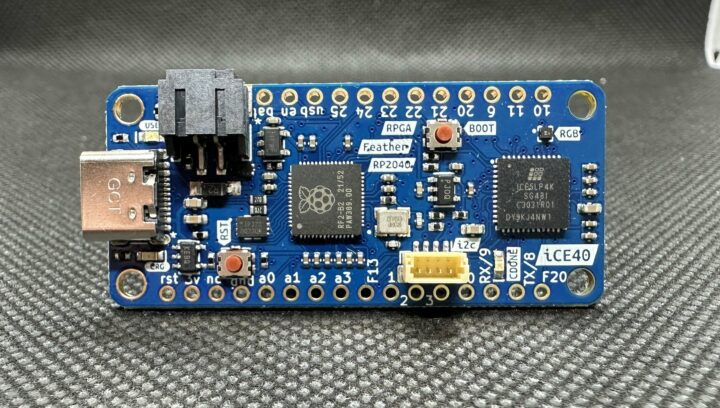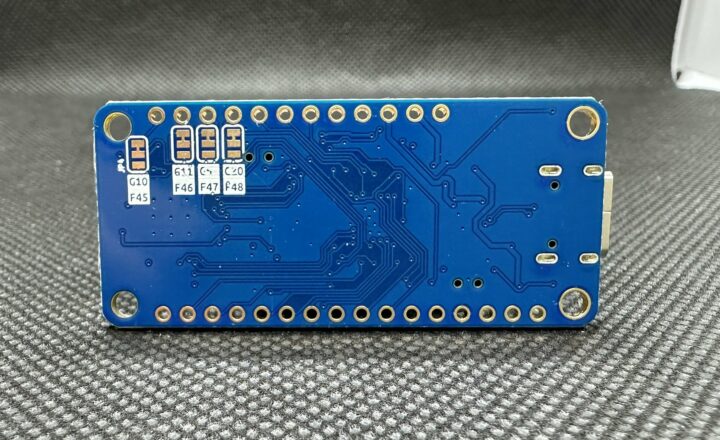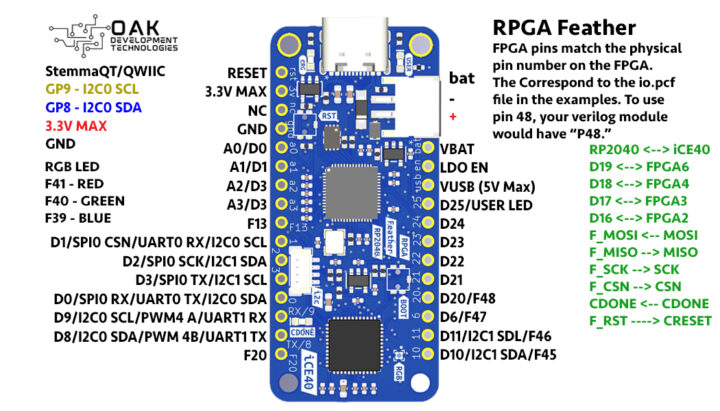Oak Development Technologies’ RPGA Feather board integrates the Raspberry Pi RP2040 microcontroller with the iCE5LP4K FPGA from Lattice Semiconductor into a compact development board in the Adafruit Feather form factor.
The iCE5LP4K FPGA is an ultra-low-power chip in the iCE40 Ultra product family designed for mobile applications such as smartphones, tablets, and handhelds, while the Raspberry Pi RP2040 microcontroller makes it much easier to program the FPGA using CircuitPython.
We have seen Oak Development Technologies’ earlier forays into FPGA Feather-compatible products such as the IcyBlue board (also based on iCE5LP4K FPGA) and the Lattice FeatherWing.
RPGA Feather specifications:
- MCU – Raspberry Pi RP2040 dual-core Cortex-M0+ microcontroller @ 133 MHz with 264KB SRAM
- FPGA – Lattice Semiconductor iCE5LP4K FPGA
- Logic Cells – 3,520 logic cells
- Memory
- 80 Kbits of embedded Block RAM (EBR)
- Distributed RAM: 640 bits
- 2x hardware I2C blocks and 2x hardware SPI blocks
- 26 I/Os for customized interfaces
- Storage – 2MB QSPI flash (W25Q16JV module)
- USB – 1x USB 2.0 Type-C Host/Device port for power and RP2040 programming
- Expansion
- 2.54mm pitch headers with RP2040
- Up to 11x GPIOs connected directly to RP2040 from iCE5LPK (with 3 pins used for programming the bitstream onto the FPGA)
- STEMMA QT/QWIIC 4-pin JST PH connector
- 4x jumper blocks on the bottom to connect additional pins to the RP2040 or provide IO for the FPGA
- Clock Management
- 1x PLL (phase-locked loop) for generating additional clocks
- 2x internal oscillators
- Misc
- Up to 4x LED indicators, including RGB LED driven by FPGA, charge indicator, CDONE LED, and user LED
- 2x push buttons (boot and reset)
- Power & Battery
- 5V via USB-C port
- MCP73831 1S LiPo charge management controller for charging a LiPo battery
- Dimensions – TBD
The Raspberry Pi RP2040 makes it easy to program the iCE5LP4K FPGA using CircuitPython. Three pins on the RPGA Feather are responsible for programming the bitstream directly onto the FPGA. With the aid of open-source tools such as Yosys OSS CAD Suite, the CircuitPython Community Bundle, and your favorite CircuitPython IDE, you can set up your development environment and start building applications using the RPGA Feather dev board. The board is also open-source hardware with schematics, bill of materials, production files, and usage examples available on GitHub.
The RPGA Feather board is available for about $47 on Tindie (with volume discounts starting from 10 boards). It is slightly more expensive than the Pico-Ice board which has a similar RP2040 + iCE40 FPGA design.

Tomisin is a writer specializing in hardware product reviews, comparisons, and explainers. He is very passionate about small form factor and single-board computers.
Support CNX Software! Donate via cryptocurrencies, become a Patron on Patreon, or purchase goods on Amazon or Aliexpress







